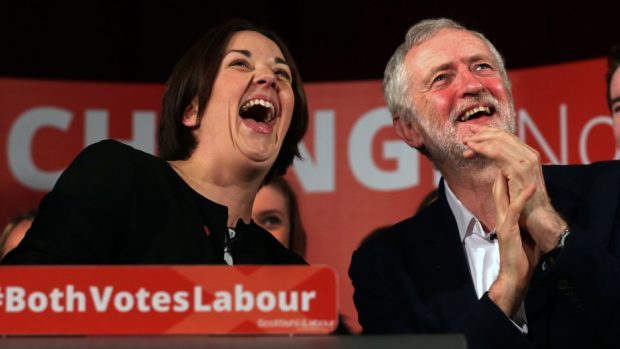A defiant Jeremy Corbyn has made his determination to carry on as Labour leader clear – despite a humiliating defeat in the Copeland by-election at the hands of the Conservatives.
The veteran left-winger, who will address his party’s Scottish conference tomorrow, came under immediate pressure to consider his position.
Long-time Labour MP David Winnick described Mr Corbyn as an “obstacle” to victory.
Meanwhile, his colleague John Woodcock – a vocal Corbyn critic – warned the party was “on course to a historic and catastrophic defeat” at the next general election.
But shadow chancellor John McDonnell issued a plea for unity, claiming the result was not a judgement on Mr Corbyn’s leadership.
And Kezia Dugdale said she had “every faith” in the UK leader.
The Aberdeen-born MSP pointed to his two leadership election wins and insisted he could “absolutely” take Labour to a general election victory.
She added: “What people want to vote for is a united party and I’m fully behind Jeremy Corbyn in his efforts to renew and rebuild the Labour party across the whole of the UK – just as I know that he supports my efforts here in Scotland, where I’ve
got a long plan to renew the party’s fortunes.”
As the soul-searching began south of the border, delegates at the Scottish conference in Perth debated her vision for a new Act of Union as part of proposals for a more federal UK.
The party had a better night in the Stoke-on-Trent Central seat where it held off a challenge from Ukip Leader Paul Nuttall.
Mr Corbyn called the win there “a decisive rejection of Ukip’s politics of division and dishonesty”.
But other than saying Labour’s message was “not enough to win through” in Copeland, he was less willing to talk about the defeat.
Fielding questions after a speech on Brexit, Mr Corbyn was asked whether he had “looked in the mirror and asked himself the question: ‘Could the problem actually be me?'”
The Labour leader replied with a simple “no” and – when asked why not – said only: “Thank you for your question.”
Mr McDonnell defended Mr Corbyn, putting the party’s difficulties down to leadership challenges and the division these have sown.
Tory Trudy Harrison took the Cumbrian seat, which had been held by Labour since the constituency was formed in 1983, with a majority of 2,147.
Its predecessor constituency – Whitehaven – had returned Labour MPs since 1935.
It was also the first time a governing party had gained a seat in a vote outside of a general election since 1982.
According to Professor John Curtice, of Strathclyde University, the result was the best by-election performance by a governing party in terms of the increase in its share of the vote since January 1966.
In Stoke, a seat held by Labour since it was created in 1950, Gareth Snell secured a comfortable win.
But, although the party secured a 2,620 majority, its vote share fell by around 2%, while Ukip’s went up by the same amount.
Mr Nuttall had hoped to capitalise on anti-EU sentiment in Stoke, dubbed the Brexit capital of Britain after last year’s referendum.
But his campaign took a hit when he was forced to apologise for a false claim on his website that he lost “close friends” in the Hillsborough disaster.
He said Ukip was “not going anywhere” and insisted the party’s “time would come”.
